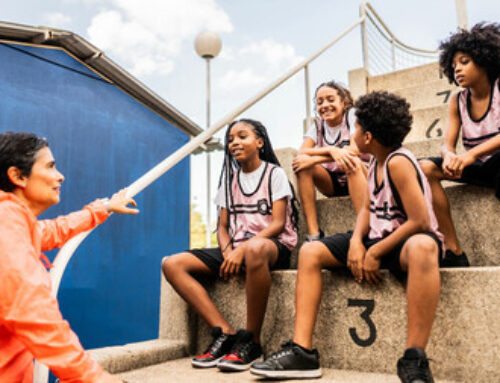A Shocking Number of Youth Sports Coaches Are Unqualified for the Gig
A great youth sports experience starts with a great coach. The problem is, the number of great coaches in youth sports seems to be decreasing. Many good ones have simply hung up their clipboard after deciding increasingly overzealous parents weren’t worth the trouble. Going off that, many youth coaches are a parent of a player on the team, and as certain parents have made youth sports a more stressful activity where stats and wins are valued above having fun, the same philosophies have leaked into coaching. Stumble upon a weekend soccer or basketball tournament and you’re bound to find at least one coach “joysticking” their players from the sideline.
One major issue is a total lack of training among modern youth sports coaches. Per the National Alliance for Youth Sports, “studies show that only 5-10% of youth sport coaches have received any relevant training.” Most coaches sign up simply because their child is on the team and no one else volunteered. Training, such as that offered by the NAYS, is affordable and efficient, but most importantly, it extends beyond the fundamental skills and drills of a given sport. The course to become a NAYS-certified coach includes lessons on how being a coach is “about being a role model, teacher and friend,” as well as the life skills players should learn from sports and the coach’s role in conveying those lessons. Done right, these things make youth sports more rewarding for the kids. At a time when roughly 70% of kids drop out of sports before middle school, that matters.
A report from the University of Maine found that youth athletes who play for an untrained coach drop at a rate of 26% per year, while those who play for a qualified coach drop out at 5%. The NAYS states that kids and pre-teens are more likely to experience a boost in self-esteem when playing for a qualified coach as opposed to an unqualified coach. Qualified coaches know how to make practices fun, safe and age-appropriate.
They also greatly decrease the odds of an athlete becoming a “team-hopper” who switches from one team to the next with each passing year. Parents share the blame in this increasingly common phenomenon, as some may decide that no coach, no matter how qualified, is doing “enough” for their child. However, if a coach proves to be unorganized and unqualified for their role, reasonable parents have every right to seek better options. Constantly jumping from one team to another can hamper a child’s development and prevent them from building the strong friendships that are a foundation of youth sports. It also sets a bad precedent for the future, as the ability to “change teams” becomes infinitely more difficult during the high school and college years.
So, what makes a good coach? According to research by the Aspen Institute’s Project Play initiative, kids want coaches who:
- Respect and encourage them
- Exist as positive role models
- Offer clear, consistent communication
- Have a knowledge of the sport
- Have a willingness to listen
How can you spot a bad or unqualified coach? Good coaches ask their athletes questions and actually listen to what they have to say rather than order them around like a dictator. Practice plans that seem half-baked and made up on the spot are never a good sign. However, you also don’t want a coach who micromanages every second and criticizes the kids non-stop. Particularly at the childhood levels, coaches should feel comfortable making practices and training sessions more like good old-fashioned pick-up games. Establish some basic rules, roll out a ball, and just let the kids play.
“Coaches can often be more helpful to a young player’s development by organizing less, saying less and allowing the players to do more. Set up a game and let the kids play. Keep most of your comments for before and after practice and during water breaks,” reads the U.S. Soccer pamphlet Best Practices for Coaching Soccer in the United States. “Kids need to be allowed to play freely, develop their skills and use them in a creative manner.”
How can you find a qualified coach? You’ve got to do your homework, and you’ve got to do it in advance. Investigate teams your child could potentially play for and find out who the coach is. Get info on their background and qualifications, talk to parents who currently have kids on their team, and have a conversation with the coach directly to get a sense of their values and priorities. Observing a game or practice to see them in action is another great idea. Do they practice what they preach? Do the kids look like they’re having fun? Or are they just another joysticking coach trying to live through their athletes? If your kid participates in a league where they are assigned to a specific team rather than being able to pick who they play for, inform the organizers you want your kid to land with a coach who has relevant training and/or certifications.
And if you find yourself associated with a team in need of a coach, don’t be afraid to step up. Coaching can be one of the most rewarding activities there is, and there are plenty of incredible resources that can help you become an educated, qualified coach. In addition to the National Alliance for Youth Sports, the Positive Coaching Alliance is an awesome resource for current or aspiring coaches.
Photo Credit: SeventyFour/iStock
READ MORE:
RECOMMENDED FOR YOU
A Shocking Number of Youth Sports Coaches Are Unqualified for the Gig
A great youth sports experience starts with a great coach. The problem is, the number of great coaches in youth sports seems to be decreasing. Many good ones have simply hung up their clipboard after deciding increasingly overzealous parents weren’t worth the trouble. Going off that, many youth coaches are a parent of a player on the team, and as certain parents have made youth sports a more stressful activity where stats and wins are valued above having fun, the same philosophies have leaked into coaching. Stumble upon a weekend soccer or basketball tournament and you’re bound to find at least one coach “joysticking” their players from the sideline.
One major issue is a total lack of training among modern youth sports coaches. Per the National Alliance for Youth Sports, “studies show that only 5-10% of youth sport coaches have received any relevant training.” Most coaches sign up simply because their child is on the team and no one else volunteered. Training, such as that offered by the NAYS, is affordable and efficient, but most importantly, it extends beyond the fundamental skills and drills of a given sport. The course to become a NAYS-certified coach includes lessons on how being a coach is “about being a role model, teacher and friend,” as well as the life skills players should learn from sports and the coach’s role in conveying those lessons. Done right, these things make youth sports more rewarding for the kids. At a time when roughly 70% of kids drop out of sports before middle school, that matters.
A report from the University of Maine found that youth athletes who play for an untrained coach drop at a rate of 26% per year, while those who play for a qualified coach drop out at 5%. The NAYS states that kids and pre-teens are more likely to experience a boost in self-esteem when playing for a qualified coach as opposed to an unqualified coach. Qualified coaches know how to make practices fun, safe and age-appropriate.
They also greatly decrease the odds of an athlete becoming a “team-hopper” who switches from one team to the next with each passing year. Parents share the blame in this increasingly common phenomenon, as some may decide that no coach, no matter how qualified, is doing “enough” for their child. However, if a coach proves to be unorganized and unqualified for their role, reasonable parents have every right to seek better options. Constantly jumping from one team to another can hamper a child’s development and prevent them from building the strong friendships that are a foundation of youth sports. It also sets a bad precedent for the future, as the ability to “change teams” becomes infinitely more difficult during the high school and college years.
So, what makes a good coach? According to research by the Aspen Institute’s Project Play initiative, kids want coaches who:
- Respect and encourage them
- Exist as positive role models
- Offer clear, consistent communication
- Have a knowledge of the sport
- Have a willingness to listen
How can you spot a bad or unqualified coach? Good coaches ask their athletes questions and actually listen to what they have to say rather than order them around like a dictator. Practice plans that seem half-baked and made up on the spot are never a good sign. However, you also don’t want a coach who micromanages every second and criticizes the kids non-stop. Particularly at the childhood levels, coaches should feel comfortable making practices and training sessions more like good old-fashioned pick-up games. Establish some basic rules, roll out a ball, and just let the kids play.
“Coaches can often be more helpful to a young player’s development by organizing less, saying less and allowing the players to do more. Set up a game and let the kids play. Keep most of your comments for before and after practice and during water breaks,” reads the U.S. Soccer pamphlet Best Practices for Coaching Soccer in the United States. “Kids need to be allowed to play freely, develop their skills and use them in a creative manner.”
How can you find a qualified coach? You’ve got to do your homework, and you’ve got to do it in advance. Investigate teams your child could potentially play for and find out who the coach is. Get info on their background and qualifications, talk to parents who currently have kids on their team, and have a conversation with the coach directly to get a sense of their values and priorities. Observing a game or practice to see them in action is another great idea. Do they practice what they preach? Do the kids look like they’re having fun? Or are they just another joysticking coach trying to live through their athletes? If your kid participates in a league where they are assigned to a specific team rather than being able to pick who they play for, inform the organizers you want your kid to land with a coach who has relevant training and/or certifications.
And if you find yourself associated with a team in need of a coach, don’t be afraid to step up. Coaching can be one of the most rewarding activities there is, and there are plenty of incredible resources that can help you become an educated, qualified coach. In addition to the National Alliance for Youth Sports, the Positive Coaching Alliance is an awesome resource for current or aspiring coaches.
Photo Credit: SeventyFour/iStock
READ MORE:










